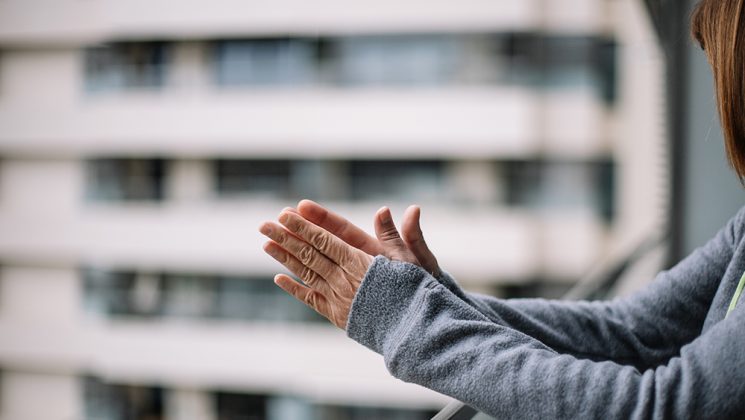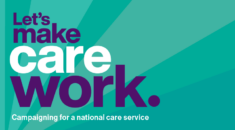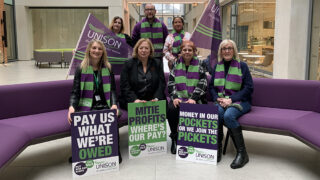UNISON steward Hassan Ortega works for a charity providing a homelessness prevention service in Salford. He said:
“I feel mixed about #ClapForCarers. It’s great that it’s raised the profile of workers in the community sector who are providing services that are keeping people safe, healthy and protected.”
However, Hassan notes that what carers really need is not to be left unprotected and vulnerable themselves – and not to be outsourced. “In some respects, it could be seen as a diversionary activity to keep the public busy. But I value that it’s raised the profile of a group of workers who were pretty much side-lined until recently.”
And he continues: “Care workers are committed to enhancing the quality of life for those they work with, while themselves often enduring poor terms and conditions and poverty pay. For too long they have been undervalued, unsupported and poorly remunerated. And they undertake this work in a myriad of settings – in day centres, residential care facilities and individual’s homes.
“Throughout the COVID-19 crisis, our dedicated care workers have continued to work in the most physically and emotionally challenging conditions in their workplaces.”
Hassan’s frontline work has been hugely affected by the pandemic. He explains: “We’re a community hub that sees a footfall of over 100 people daily, and those people are marginalised, vulnerable and often in crisis.
“We’re situated right in the heart of Salford city, which has a high degree of social housing and pockets of poverty surrounding us. We usually provide free lunch, food and support to people who are in crisis, and also socially isolated.
“But in order to protect our service users and ourselves, we’ve had to close our doors to a large cohort of service users.”
“We’re currently unable to offer the high level of service we previously did. However, we’re maintaining a skeleton staff to work with those people who are most marginalised.”
At present, it’s voluntary and community services like Hassan’s that provide a lifeline to a wide-ranging group of people who still need to access statutory services. He gave a recent example.
“One of the things that the crisis has highlighted is that a lot of statutory and voluntary provision has gone digital – and that’s great for those people who are digitally included and don’t have literacy or numeracy issues.
“But recently, we had somebody who went to the council housing department for a homeless presentation. The department was closed, with a notice on the door saying that they are doing homeless presentations over the telephone. But that person couldn’t read, so they didn’t know what the sign said. They then walked two miles to our hub and presented to us. I got on the phone to the council, and later on in the day, the council put them in emergency housing provision.
“Yesterday we had a guy who was masked up, fully protected, but he disclosed suicidal ideas. He was medicated for mental health issues, and he was finding the strain and stress of being socially isolated really devastating.
“Obviously, our default position is to present at A+E to the crisis team. That’s a few miles away and he had to make the choice to risk going on public transport to access the hospital. Eventually he made call to his GP, who could help.”
Responding to the government’s recent categorisation of social carers as “unskilled workers”, Hassan comments:
“Labelling care workers as ‘unskilled’ denigrates the absolutely fantastic contribution that care workers provide for society. They are nothing but supremely skilled. These are people that have to ensure that the most vulnerable in society are safeguarded and cared for professionally.
“It’s appalling and it just shows you how out of touch the government is to quantify them as being unskilled. Ultimately, by doing that, it does nothing to address the already massive staff shortage in care work.
“Prior to COVID-19, we had staff shortages of around 122,000 and I was appalled that they didn’t allow visa extensions for care workers, because they’re sorely needed.”
UNISON member Sarah McKinnon works for a charity in the South West providing support to adults with learning difficulties. She said:
“I was getting a little aggrieved when #ClapForCarers was only talking about the NHS. Don’t get me wrong – the NHS needs all the help it can get, but I felt the social care and key worker sector had been left out of the equation. Now they’ve included social care and key workers, our work is being recognised”.
“The reality is, the social care sector has picked up some of the services that the NHS and local authorities used to provide. That includes things like mental health outreach, housing associations, drug and alcohol services and homelessness support.
“It’s rubbish to say that care work is unskilled. It takes a great deal of interpersonal skills to support someone needing support to live the life they want to lead. Care workers may not have qualifications, but that is not the same as being ‘unskilled’. We’ve got some highly skilled staff and highly dependent service users.”
Sarah’s organisation provides supported accommodation to adults with learning difficulties. Under lockdown conditions, social distancing is difficult, and staff are having to use common sense when supporting people to take their exercise.
“Staff morale is pretty good right now, but PPE (personal protective equipment) has been a nightmare to get hold of – and still is. It’s been horrendous. At the moment, we’ve got gloves and aprons, but any of the more higher-grade stuff – masks and goggles – are like gold dust. At the moment staff morale is good, they’re doing very well.
“I hope when all of this is over, the government realise what a massively skilled workforce is out there delivering care and support in many different environments and recognises it financially in the contracts local authorities offer care providers.”
UNISON member David Robinson is a residential support worker for a children’s home in Blackpool. When asked about #ClapForCarers, he said that rethought it was great at first.
“But I find a bit cringeworthy now, as it is more about those clapping than those who are carers. If it focuses the attention in the future on resources to be put where they’re needed, then great. Otherwise, it is nothing but a distraction”.
Many carers are risking their lives going to work without proper PPE. Right now, David is pushing for better access to such equipment at his work. So far, he’s received no training or instruction from management, and is feeling left in the dark.
“Whether it’s a supply problem or what, I don’t know. I don’t think it is. They’re trying to put it down to guidance, but I can’t find any guidance specifically on children’s homes.
“I know they’re trying to keep things as normal as possible, but we’ve all got families to go home to. There’s 10-12 people working in the home that I’m at, and if you think about how many people they each individually come into contact with, and the whole trail, it’s concerning.
“Do the children in the home want to be wearing it? We don’t know.”
But across the country, many carers don’t have a choice in whether they go to work or not: already in financially precarious and low-paid jobs, they can’t afford not to work.
David continues. “I’m not frightened to go to work, but one of the staff members has elderly parents and she’s been worried about it. I know it’s a concern for her. She can’t really not work either, because her husband’s self-employed. She has to work because she can’t afford to take a drop in wages.”
“It’s bad enough on a lockdown and, if we’re working in services, we need to be looked after. We’re not asking for any preferential treatment. We just want to be treated like our health matters – obviously management’s does, because they’re all working from home.”
UNISON national officer Andrew Dobbie said: “UNISON is working as hard as it can to support our care worker members, and in particular to get the vital protective equipment they need.
“And when the clapping dies down, UNISON will still be fighting for care workers to be properly treated: paid living wages, with proper job security and career structures, reflecting the vital nature of their contribution to national life. They should be recognised all year round and every year.”
• Tell us your story of working through the coronavirus crisis – email us at editorial@unison.co.uk.



